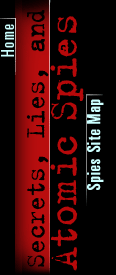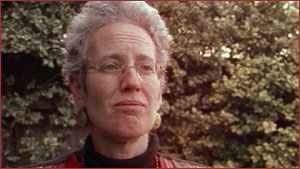
|

|
|
|
 Hear Ruth Hall's thoughts on why her father passed
atomic secrets to the Soviets.
Hear Ruth Hall's thoughts on why her father passed
atomic secrets to the Soviets.
View the video clip in:
QuickTime
| RealVideo:
56K/
ISDN+
Get video software:
QuickTime
|
RealVideo
|
Family of Spies
Ruth Hall
Back to Intro
See a photograph of Ted Hall
NOVA: When and how did you learn about your father
giving atomic secrets to the Soviet Union?
Ruth Hall: Well, my parents told me they had
something to tell me. They came to London, and we went to a
very crowded little Indian restaurant. As soon as my father
started, I broke into a smile, because I wasn't surprised.
My partner sometime ago, back in the 1970's, had suggested
that this might be the case.
And I thought it very likely was, because given the position
he was in, given what I knew about his views, and given what
I knew about his courage, I thought that this would be a
logical thing for him to have done. I knew he was a very
principled person, and he could have done it. So that was in
the back of my mind for years, and when they finally told
me, it was confirmation.
NOVA: What did you think about it? What did you think
of his action?
Ruth Hall: I was very proud of him. I understood why
he'd done it. He said that he'd done it to prevent a
monopoly of power in the hands of the U.S. government. I
think we've seen now, and even at the time when he told me
we were seeing, what the results of that monopoly were.
We've seen the U.S. feeling that it could just trample all
over the world because there was no one to stop it. We've
seen it using depleted uranium in the Gulf, in Kosovo,
whereas before with the Soviet Union it felt that it had to
think twice before using what amount to nuclear weapons.
Now, with the death of the Soviet Union, there's no powerful
state to stand up to them. Cuba tries to stand up, but it's
very small, and there are youth with stones in Palestine,
there are revolutions in South America, but there's no
state. I think that does make a difference.
There is a big movement that I think my father was part of.
He came out of something. I mean, there were many, many
people standing up to the Nazis. There was a movement that I
think also gave him the courage to do what he did. He saw
what he knew had to be done, and he did it. I thought that
was a principled action very much in line with what I knew
of him.
NOVA: Now, you also know that Stalin ruled the Soviet
Union as an absolutely despicable despot. So one could say
that your father unwittingly handed over vital military
secrets to a dictatorship. How do you react to that?
"I'm very proud of what they both did."
|
|
Ruth Hall: The Soviet Union was a disaster. I've
never had anything to do with it, or with the Communist
Party, in fact. I'm part of the women's movement and one of
many people in the world who have not been associated with
the Soviet Union, but are appalled at what the U.S.
government is doing. It is a fact that for some decades the
Soviet Union was a counterbalance that prevented some of the
worst excesses—prevented, for instance, what very
likely would have happened, the bombing of China. We can
only be grateful for that.
NOVA: Is it a funny feeling to think that your mom
and dad lived a whole secret life that you knew nothing
about? Tell me how that feels.
Ruth Hall: I think it's an amazing tribute to them
that they were able to do that. I think very highly of my
mother (as well as my father) for her having helped him have
the strength to keep it secret and prevent the government
from having another victory, as they had over the Rosenbergs
with that ruthless murder of those two people. And I'm very
proud of what they both did. [Read an interview with
Joan Hall, Ruth Hall's mother.]
NOVA: What do you cherish most about your father?
Ruth Hall: That's really an impossible question with
somebody as unique and wonderful as Ted was. I mean, we all
knew him as an enormously warm, loving man, full of humor,
full of life, with a really profound intelligence.
But I think for me personally, some of the things he taught
me. For a start, he was really devoid of ego. I mean, his
humility was legendary; he just didn't put himself first.
And he kept things in proportion. If I went to him with a
problem as an adult, he would share that sense of proportion
with me so that it became not just you but what was
happening to you, fit into its place in the world. That was
very much the quality that made it possible for him to do
what he did. Also, I think he really taught me to dare to
think for myself, and to think things through with an
honesty and depth that he achieved, and I aspire to.
I think my father did what he did because not to do it was
also taking another kind of action. When people have
privileged information, as he did, and they hold onto
it—that is, they keep it protected by their employers,
governments, or corporations, whoever it is, and prevent
other people from having that information—they are
deciding the fate of those of us who are dependent on it.
|
"We need people who dare to come forward as he did."
|
We who don't have the information are very dependent on
people who are in positions in the establishment, and
especially the scientific establishment, people who have
information which is vital to our lives. We're dependent on
them to do what he did, as whistle-blowers, as people who
share something vital about global warming, about the
dangers of meat, you know. We as people who don't have
scientific information are very dependent on scientists like
him who share what they have.
Now, it might not be about nuclear weapons. It might be
about genetic engineering, or it might be about global
warming. But we need people who dare to come forward as he
did and let the rest of the world know what they know.
Joan Hall
| Ruth Hall |
Boria Sax |
Robert and Michael Meeropol
|
William Weisband, Jr.
Read Venona Intercepts
|
Family of Spies
20th-Century Deceptions
|
Decipher a Coded Message
Resources
|
Transcript
|
Teacher's Guide
|
Site Map
Secrets, Lies, and Atomic Spies Home
Search |
Site Map
|
Previously Featured
|
Schedule
|
Feedback |
Teachers |
Shop
Join Us/E-Mail
| About NOVA |
Editor's Picks
|
Watch NOVAs online
|
To print
PBS Online |
NOVA Online |
WGBH
©
| Updated January 2002
|
|
|
|